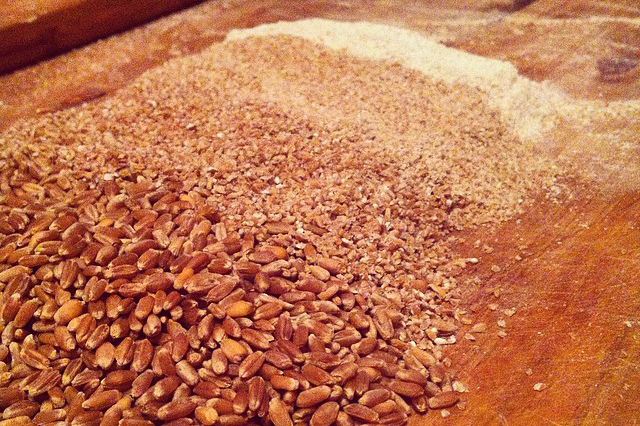Baker Miller Wants To Bring You A Better Flour
By Melissa McEwen in Food on Aug 18, 2014 4:30PM
Living in the nation’s breadbasket, you might expect our farmer’s markets to be full of bushels of grain. Yet at your local farmer’s market, stands selling cucumbers are likely to outnumber those selling grains. That’s because most of our state’s grains are produced at a commodity level and end up exported, in a gas tank (as ethanol) or in livestock feed. But the new Baker Miller Flour Company aims to connect more of us to our local grains and show off what makes them so special.
While many are looking forward to the desserts from Bang Bang Pie Shop veterans Dave and Megan Miller, the shop aspires to be more than just a place for sweet treats. The couple spent years baking with conventional flour, but as they learned more about health and about flavor, they yearned for something more. “The core of our business is we want to work with Midwestern farms that are producing high-quality grains and present flour and grain as something to actually think about” says Dave Miller.
Their goal is to be a hub for grain products that taste better and are better for you. “There are nutrients in grain that are actually good for people that have been sifted out. We think many issues with gluten sensitivities and everyone wanting to avoid carbs is because they are avoiding processed and refined flours that are bad for them. The stuff that is refined out that helps your body process them.… I strongly believe it is a thing, we’ve modified it to the point our bodies can’t recognize it for food. How can we produce a product that’s real—that your body can break down?”
So far they are working on building their product line by working with local farmers to find the best varieties that taste great and grow well in our region. “Grain value has been pushed so far down, even if our grains cost three times what commodity flour costs, there are still good margins on it.… with coffee back in the day people thought it all cost the same price and should be 30 cents a pound for the farmer, now some people are paying $7 a pound to farmers. [Paying more] incentivizes [farmers] to grow better grain, that’s processed better, and to pay attention to the land. It’s a high margin crop, doesn’t take a lot of water, and it’s good to the soil.”
Their signature items will be soft wheat, which is the wheat that grows best locally and is used for pastry, corn and oats. “These oats are phenomenal. They are sweet and naturally taste like cinnamon. That blew my mind…we are not all heirloom yet. But eventually we want our full line to be heirloom and heritage” says Dave. In the pipeline is einkorn, an ancient heritage wheat, and buckwheat, which is actually a “pseudograin”—a seed from a non-grass plant that is cooked like a grain.
As far as the milling, they are experimenting with different grinds and textures. Dave says their grits are a great example “Our grits have all different sizes, fine to coarse- you need those really fine particles for that creamy texture and volume, but some part still slightly crunchy, though you don’t want that to overpower.” He says he welcomes people to bring in their favorite flours that they have trouble finding and they will attempt to replicate them.
“We are going to do our very best. A lot of this is new to the city, new to us- this is part of what is taking us so long. But we want to be first to the market. It’s easy to fake it with grains: take non-organic GMO grains and mill them and call them artisan. We are avoiding anyone doing it before we get to market we can set the standards” Dave says.
They plan on celebrating the German heritage of the neighborhood and their families. Their goal is to do two types of breads: one very traditional and another that’s they own style and richly dense with something like rye or millet. “We have limited capacity if it does take off, we can only do so many leaves a day. We’d rather do 20 phenomenal loaves than 50 OK leaves. We’ll sell pie and coffee and hopefully the flour company will take off so we can use shop as a creative outlet”
They have big plans for their flour beyond just their own baking and restaurants, hoping to have it sold in stores across the region. If you want to get in on the initial bounty of bushels, their Kickstarter is still taking backers until Wednesday afternoon.
